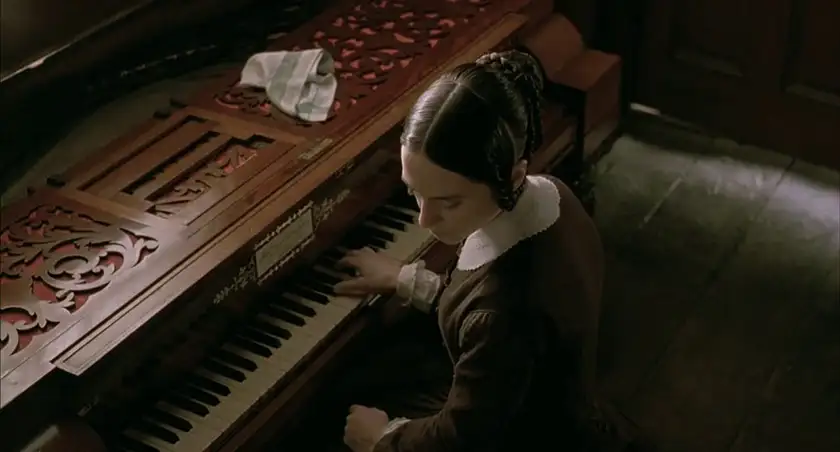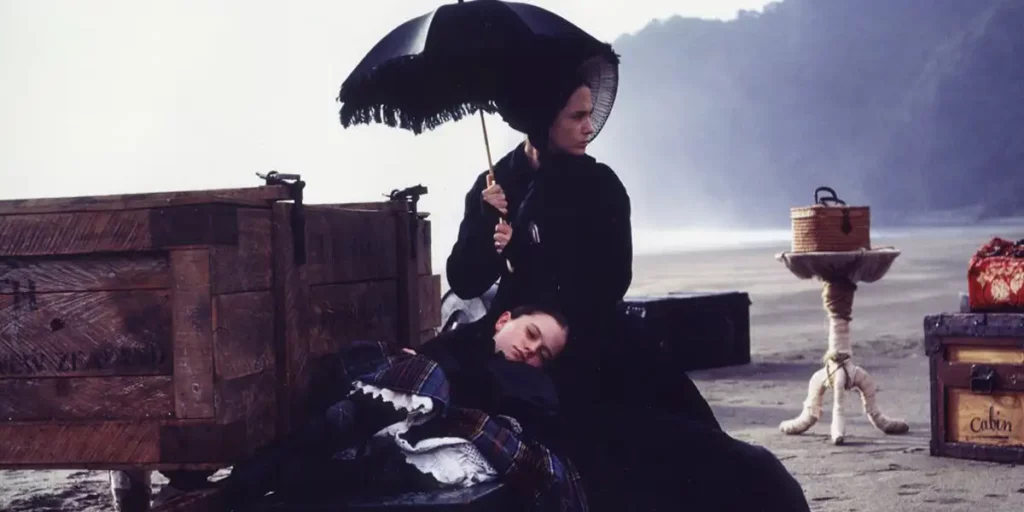The Piano is one of Jane Campion’s most intriguing films, a melodic and melancholic tale of a mute woman with a powerful musical voice.
Jane Campion’s The Piano is a beguiling and incredibly lyrical piece of cinema. It’s a film that is content to bask in its mystery and its metaphor, firmly establishing Campion as a groundbreaking writer and director. It still feels as rich, strange and poignant as it did upon its initial release in 1993, very much still worthy of its Palme d’Or and three Academy Awards. The Piano is intriguing in that it features a female lead without a voice, yet one who remains a powerful portrayal of female agency – as much as one were able to be in the 1800s – and isn’t afraid to show beauty and bleakness in equal measure.
Ada (Holly Hunter) has been mute since the age of six. Now a grown woman with a young daughter, Flora (Anna Paquin), she is being shipped to New Zealand and married off to a man, Alisdair (Sam Neill), whom she has never met. Upon their arrival, Ada and Flora are left to wait on the beach for a night until Alisdair arrives with a group of Māori locals to help them move their stuff. Alisdair almost immediately declares Ada’s prized piano as too bulky to carry back, and Ada is furious and distraught at the thought of leaving it behind.
George Baines (Harvey Keitel), a white man who has ‘gone native’ – aka, gotten some traditional Māori face tattoos and learnt to speak the language – works on Alisdair’s land, and is immediately intrigued by Ada. He arranges for the piano to be brought to his house instead and bargains for ‘lessons’ with Ada, thinly veiled excuses for her to play the piano and for him to listen, watch and touch her. It’s an exploitative endeavour to begin with, but Ada comes to care for George, and the lessons blossom into a dangerous affair.
Campion isn’t afraid of silence, but there is never a moment when The Piano isn’t saying something. It’s a film full of loaded glances and exquisite details. It’s compelling in its atmosphere, feeling and tone rather than its narrative, which remains relatively simple, all things considered. And there is a peculiarity to the film, an emphasis on the strangeness of the lush forests and wild beaches of Campion’s native New Zealand, that conveys so much about this time, this place and these people, that even an establishing shot of the location is involved in telling the story.
Stuart Dryburgh’s cinematography is entirely in keeping with The Piano’s mood. Whether it’s exploring character dynamics, navigating spectacularly atmospheric scenery or simply showing us Ada’s hands as she plays the piano, the camera is constantly aiding in the film’s richness, toeing the line between voyeurism and involvement that Campion plays with in her characters, too.

And as the character the film revolves around, Hunter is astounding. She silently expresses everything she needs to, embodying Ada’s anger, repression, rebellion and passion with precision. Whilst bookending the film with pieces of narration, Campion never explicitly shows Ada uttering a single word on screen. And yet she isn’t voiceless. Through a combination of sign language and short notes – often statements and orders, rather than questions – from a silver pad and pencil she keeps on a chain around her neck, Ada conveys words to others. But it’s through her piano that she speaks the most. Every piece of music Ada plays is a response to her emotions, the instrument is an extension of her.
At the beginning of the film, as Ada and Flora are stranded on the beach with their belongings scattered around them, the piano is almost a guardian. A comfort in this strange, foreign land. Ada softly caresses Flora’s face as she sleeps, before reaching a hand through the crate’s wooden slats to do the same to the ivory keys. It equates them both as part of her, equally as important to who Ada is as a person. And Michael Nyman’s musical score does an excellent job of embellishing Ada with agency, power and dialogue through the sounds of the piano. The score is moving and haunting, but also light and near jovial when it needs to be. It fills in the gaps for Ada, acts as her mouthpiece, even if not everyone is able to hear it.
Alongside Hunter, The Piano features a wealth of impressive supporting performances. Paquin won an Oscar for her role as Flora, a precocious girl who flits in and out of moments of pathos, naivety and anger. And for someone who was only 11 years old at the time, it’s an incredibly mature performance, layered and messy and stroppy, exactly as a young girl would be in those situations. Neill and Keitel, two celebrated actors in their own right, are somewhat overshadowed by the women on screen for the majority of the film, but their performances are certainly not lacking. They represent the different sides of Ada’s patriarchal romantic existence, the one to whom she belongs and who cannot connect with her, the other who doesn’t have a claim to her and can.
But Campion keeps the film’s focus on Ada, the gothic heroine who pours her soul into music, and marks herself as a filmmaker who understands the power of telling female-centred stories. The Piano is an incredibly well acted film, with raw emotional vulnerability making up for a lot of the – intentional, hence the ‘mystery’ – narrative gaps, stunning cinematography, and an incredibly emotive score. It’s a sparkling jewel in Campion’s crown, enchanting and mysterious in equal measure.
The Piano is now available to watch on digital and on demand. Discover more films from director Jane Campion.

